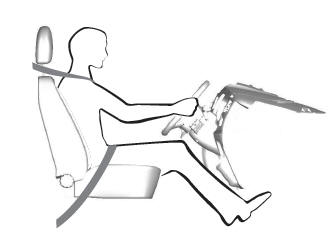Ford Escape 2020-2025 Service Manual / Powertrain / Engine / Engine Cooling / Diagnosis and Testing - Cooling Fan Control
Ford Escape: Engine Cooling / Diagnosis and Testing - Cooling Fan Control
Diagnostic Trouble Code (DTC) Chart
Diagnostics in this manual assume a certain skill level and knowledge of Ford-specific diagnostic practices.
REFER to: Diagnostic Methods (100-00 General Information, Description and Operation).
| Module | DTC | Description | Action |
|---|---|---|---|
| PCM | P0480:00 | Fan 1 Control Circuit: No Sub Type Information | GO to Pinpoint Test KN |
Global Customer Symptom Code (GCSC) Chart
Diagnostics in this manual assume a certain skill level and knowledge of Ford-specific diagnostic practices.
REFER to: Diagnostic Methods (100-00 General Information, Description and Operation).
| Symptom | Action |
|---|---|
| Start/Run/Move > Running > Overheats > Always | GO to Pinpoint Test KN |
| Start/Run/Move > Running > Overheats > Intermittent | GO to Pinpoint Test KN |
Pinpoint Tests
.jpg) PINPOINT TEST KN: VARIABLE SPEED ELECTRIC COOLING FAN MOTOR
PINPOINT TEST KN: VARIABLE SPEED ELECTRIC COOLING FAN MOTOR.jpg)
 Introduction Introduction
Refer to Wiring Diagrams Cell 033 for schematic and connector information. Normal Operation and Fault Conditions Refer to the DTC Fault Trigger Conditions. DTC Fault Trigger Conditions
Possible Sources
|
 Description and Operation - Engine Cooling - System Operation and Component Description
Description and Operation - Engine Cooling - System Operation and Component Description
System Operation
Engine coolant flows primarily from the engine to the radiator circuit
and back to the coolant pump. Coolant is sent from the coolant pump
through the engine block and cylinder heads...
 Diagnosis and Testing - Engine Cooling
Diagnosis and Testing - Engine Cooling
Special Tool(s)
Coolant/Battery RefractometerROB75240 or equivalent
D-Gas Adapter300-OTC014-R1068 or equivalent
Radiator Tester014-R1072 or equivalent
UView® Combustion Leak TesterUVU560000-R
Diagnostic Trouble Code (DTC) Chart
Diagnostics in this manual assume a certain skill level and knowledge of Ford-specific diagnostic prac..
Other information:
Ford Escape 2020-2025 Service Manual: General Procedures - Air Conditioning (A/C) System Flushing
Materials Name Specification Motorcraft® A/C System Flushing SolventYN-23 - Flushing NOTICE: Use the Refrigerant Identification Equipment before recovering any of the vehicle's refrigerant. Failure to do so puts the shop's bulk refrigerant at risk of contamination. If the vehicle's A/C refrigerant is contaminated, refer the customer to the service facility that ca..
Ford Escape 2020-2025 Service Manual: Description and Operation - Direct Current/Direct Current (DC/DC) Converter Control Module - Overview
OVERVIEW WARNING: To prevent the risk of high-voltage shock, always follow precisely all warnings and service instructions, including instructions to depower the system. The high-voltage hybrid system utilizes approximately 300 volts DC, provided through high-voltage cables to its components and modules. The high-voltage cables and wiring are identified by orange harness tape or o..
Categories
- Manuals Home
- 4th Generation Ford Escape Owners Manual
- 4th Generation Ford Escape Service Manual
- Opening and Closing the Hood
- Power Outlet - Vehicles With: 12V Power Outlet
- Locating the Pre-Collision Assist Sensors
- New on site
- Most important about car
Sitting in the Correct Position

When you use them properly, the seat, head restraint, seatbelt and airbags will provide optimum protection in the event of a crash.
Copyright © 2025 www.fordescape4.com

.jpg) PINPOINT TEST KN: VARIABLE SPEED ELECTRIC COOLING FAN MOTOR
PINPOINT TEST KN: VARIABLE SPEED ELECTRIC COOLING FAN MOTOR

.png) Introduction
Introduction